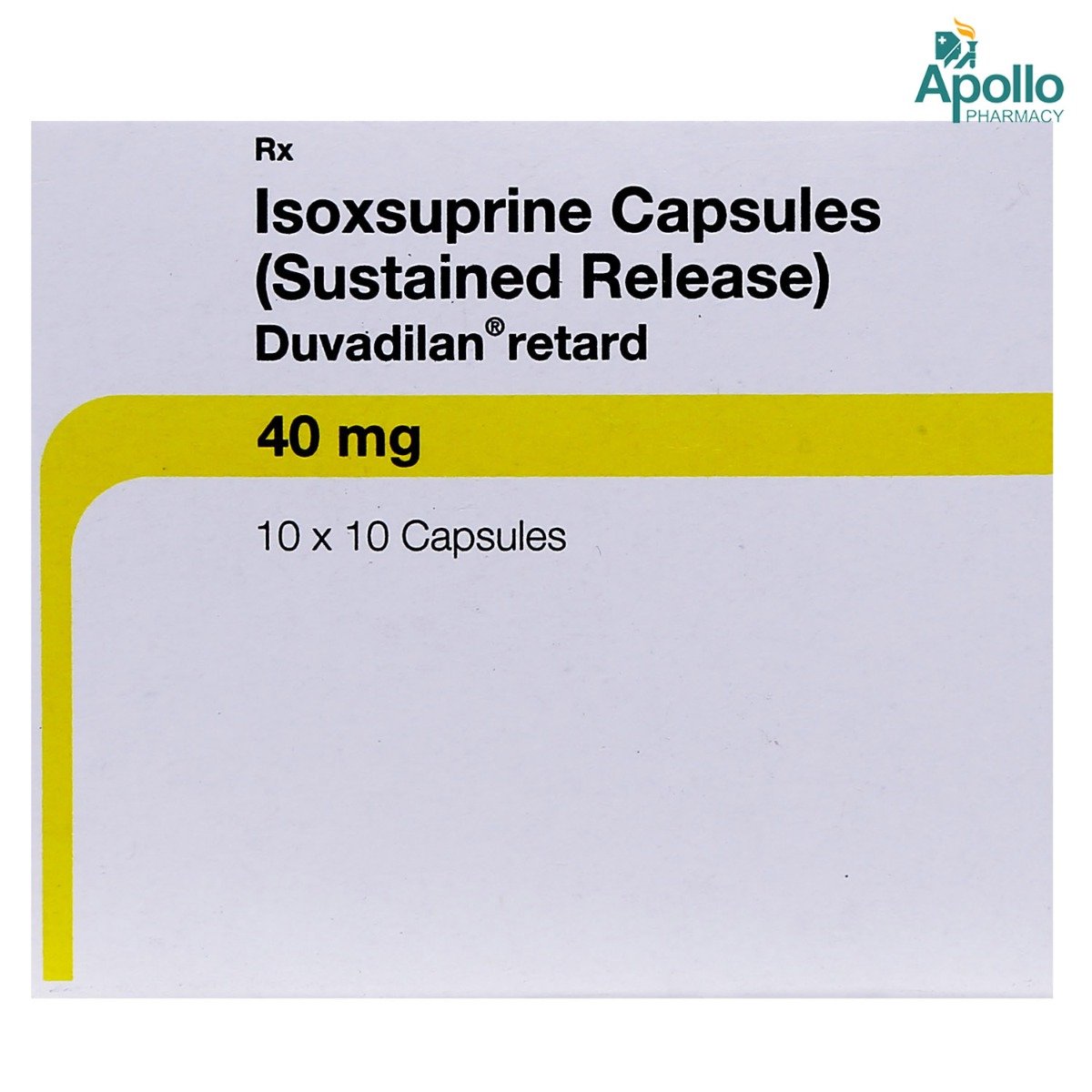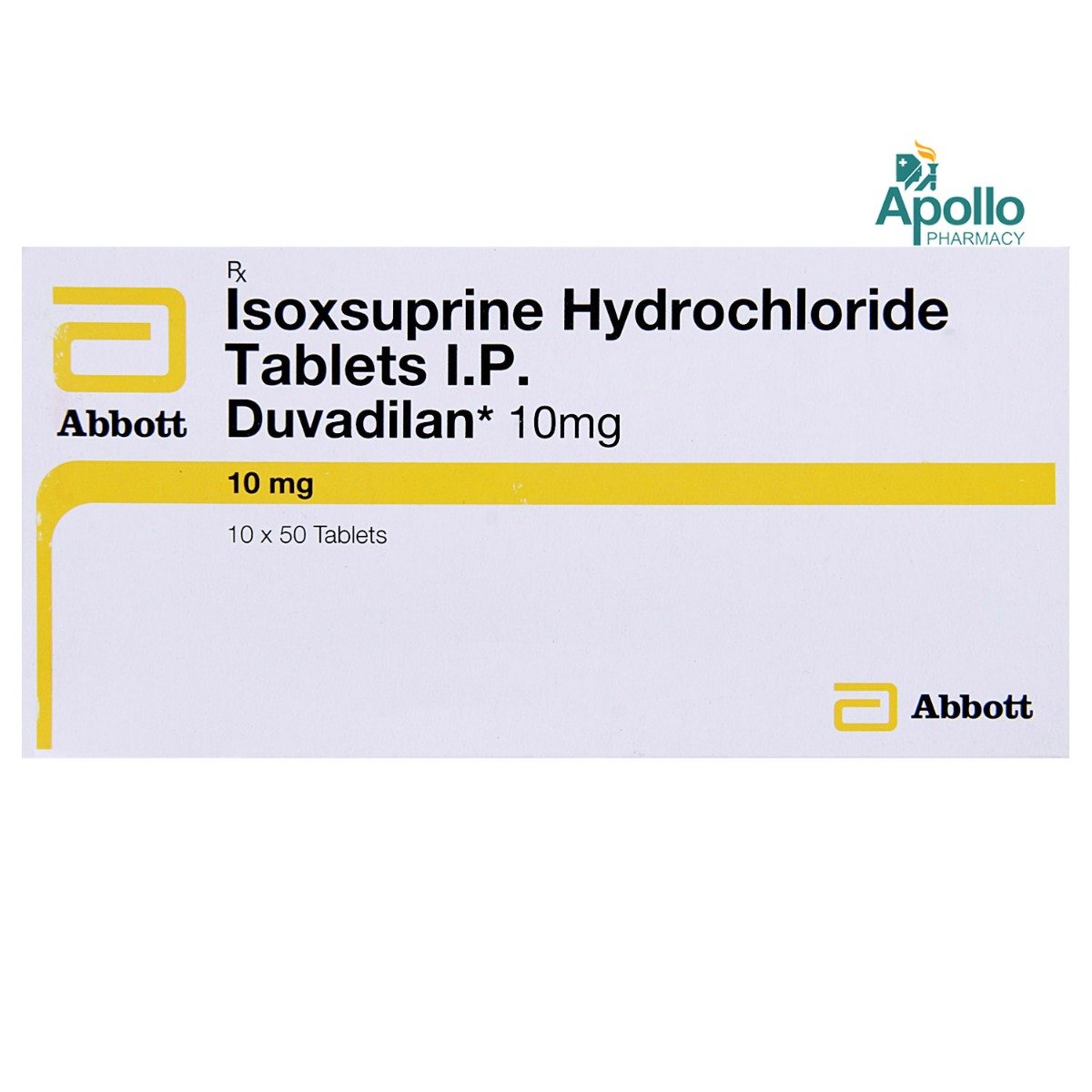Isoxsuprine
About Isoxsuprine
Isoxsuprine belongs to a class of medication called 'vasodilator' (blood vessel relaxing agent) used to treat and prevent Raynaud's phenomenon, cerebral vascular insufficiency (poor blood flow to the brain), arteriosclerosis (hardening of the arteries), and other conditions involving poor blood flow in the blood vessel (veins and arteries). Besides this, it is also used to relax uterine muscles to prevent premature labour (when the uterus starts contracting for birth earlier than usual).
Isoxsuprine contains Isoxsuprine, which relaxes and widens the blood vessels (artery/veins) and muscles (like uterine muscle), thereby increasing the blood flow to the muscles and blocking nerves, delaying contraction in premature labour pains, and poor blood flow to organs and other body parts.
Isoxsuprine should be taken regularly in dose and duration as advised by the doctor. It would be best to take it at a fixed time every day. Your doctor will advise you on the exact dosage and how often you have to take Isoxsuprine based on your medical condition. In some cases, you may experience chest pain (angina), irregular heartbeat, nausea, vomiting, and weakness. Most of these side effects of Isoxsuprine do not require medical attention and gradually resolve over time. However, if the side effects are persistent, reach out to your doctor.
Isoxsuprine should not be stopped abruptly without consulting the doctor as it may lead to unpleasant side effects. Also, it is not suitable for some people. Inform your doctor before starting Isoxsuprine if you have any bleeding disorder or heart problem. Do not do strenuous activities to avoid premature labour. Isoxsuprine may cause sudden falls in blood pressure, so if you are driving or operating a motor vehicle or doing any hazardous task, avoid it. Do not stand sudden from a lying position as you may feel dizzy. Alcohol intake with Isoxsuprine can also cause dizziness, so one should avoid its intake.
Uses of Isoxsuprine
Medicinal Benefits
Isoxsuprine contains Isoxsuprine, which is a vasodilator. It relaxes and widens the blood vessels (artery/veins) and muscles (like uterine muscle), thereby relaxing them and increasing blood circulation to these parts. It is recommended to avoid strenuous exercise and work for the best results of Isoxsuprine. So, it is prescribed for the treatment of cerebrovascular insufficiency (poor blood flow to the brain), peripheral vascular disease (blocked veins of the leg), Buerger's disease (blood clot in arm and legs) and Raynaud's disease (numb and cold sensation due to blocked nerves of hand). It helps in the prevention of preterm labour in pregnant women.
Directions for Use
Storage
Side Effects of Isoxsuprine
- Weakness
- Dizziness
- Flushing (feeling of warmth)
- Upset stomach
- Vomiting
- Stomach pain
Drug Warnings
Isoxsuprine should not be given to people allergic to Isoxsuprine, have low blood pressure (less than 90 mm of Hg), or have a heart or bleeding problem. Tell your doctor you are using the Isoxsuprine before undergoing dental or other surgery. Your doctor might stop this medicine before the surgery. Isoxsuprine should not be stopped abruptly without consulting the doctor as it may lead to unpleasant side-effects. Also, lifestyle changes should be continued with Isoxsuprine for best results and a speedy recovery. Isoxsuprine may cause dizziness, so if you are sitting, rise slowly to avoid falling and not driving or operating a car. Also, any strenuous exercise or work should be avoided to avoid delivery complications.
Drug Interactions
Drug-Drug Interactions: Isoxsuprine interacts with some medicines, so it should be used with caution with antibiotics (erythromycin, clarithromycin or rifampicin), antifungal (ketoconazole), anti-hypertensive (diltiazem, lovastatin, simvastatin, atorvastatin), anti-migraine (ergotamine, dihydroergotamine), sedatives or hypnotics (buspirone), certain antidepressants (fluoxetine and lithium), medicines to lower blood pressure (methyldopa), anti-Parkinson’s (levodopa, pramipexole, ropinirole), anti-epilepsy (phenobarbital, carbamazepine, phenytoin, rifampicin, primidone, oxcarbazepine, ethosuximide, valproate).
Drug-Food Interactions: Please tell your doctor about all the Vitamins, herbs, and supplements you are taking as Isoxsuprine may interact with them to produce unpleasant side effects.
Drug-Disease Interactions: Isoxsuprine should be taken with caution in people who have low blood pressure, a bleeding problem, especially arterial bleeding, have had a heart attack or any heart problem.
Drug-Drug Interactions Checker List:
Safety Advice

Alcohol
safe if prescribedNo interaction found; in case of any discomfort, consult your doctor.

Pregnancy
safe if prescribedIsoxsuprine is a category C pregnancy; studies suggest it is safe and does not harm the baby. Your doctor will still weigh the benefits and any potential risks before prescribing it to you.

Breast Feeding
safe if prescribedIsoxsuprine is a category C pregnancy; studies suggest it safe and does not pass through the milk. Your doctor will still weigh the benefits and any potential risks before prescribing it to you.

Driving
cautionDrive with caution, Isoxsuprine may cause blurry vision, and dizziness may occur.

Liver
safe if prescribedThere is limited information available on the use of Isoxsuprine in patients with liver disease. Please consult your doctor for the best advice.

Kidney
safe if prescribedThere is limited information available on the use of Isoxsuprine in patients with kidney disease. Please consult your doctor for the best advice.

Children
unsafeIsoxsuprine is not recommended for children as the safety and effectiveness of Isoxsuprine have not been established in children due to limited testing of this drug on children by competent authorities worldwide. If necessary, your doctor will decide whether to give Isoxsuprine or not.
Habit Forming
Diet & Lifestyle Advise
- Keep your weight under control with a body mass index (BMI) of 19.5-24.9.
- Opt for a diet rich in whole grains, fruits, veggies, and low-fat dairy products.
- Limit sodium chloride (table salt) intake in your daily diet to 2300 mg per day or less than 1500 mg is ideal for most adults.
- If you are taking alcohol, then only one serving for women and two servings is advisable.
- Quitting smoking is the best strategy to lower the risk of heart disease.
- Avoid chronic stress as it can raise your blood pressure. Try to enjoy and spent time with your loved ones to cope with stress and practice mindfulness techniques.
- Monitor your blood pressure daily and if there is too much fluctuation, then immediately contact your doctor.
- Try to include heart-healthy omega-3 fatty acid-containing food drinks in your daily diet. You can also use low-fat cooking oil like olive oil, soybean oil, canola oil, and coconut oil to lower your elevated blood pressure.
Special Advise
- Use caution while driving a motor vehicle, operating machinery, or performing other hazardous activities as, Isoxsuprine may cause dizziness, so if you experience dizziness or drowsiness, avoid these activities. Try to rise slowly from a sitting or lying position to avoid falling.
- Notify your doctor if you experience skin rash or palpitations (irregular heartbeats) after using Isoxsuprine.
- Do not use Isoxsuprine immediately after bleeding from childbirth (postpartum) and artery (blood vessel).
Patients Concern
Disease/Condition Glossary
Premature labour: Also known as preterm labour, occurs when regular contractions and relaxations of the uterus result in the opening of your cervix after week 20 and before week 37 of pregnancy. It can lead to premature birth and other greater risk to the baby.
Cerebrovascular insufficiency: It occurs when there is obstruction of one or more blood vessels (arteries) that supply blood to the brain. This obstruction leads to strokes or transient ischemic attacks (TIAs or 'mini-strokes').
Buerger's disease: Buerger's disease occurs commonly in the arms and legs where blood vessels get swollen, thereby preventing blood flow, causing clots to form. This leads to pain, tissue damage, and the formation of gangrene (death of body tissues).
Raynaud's phenomenon: Raynaud's phenomenon occurs due to blocked nerves resulting in discolouration of the fingers and/or the toes after exposure to extreme cold or hot temperatures conditions. Skin discolouration shows a diminished blood supply to the local tissues.
FAQs
Isoxsuprine contains Isoxsuprine, which relaxes and widens the blood vessels (artery/veins) and muscles (like uterine muscle), thereby increasing the blood flow to the muscles and blocking nerves, delaying contraction in premature labour pains, and poor blood flow to organs and other body parts.
If you forget to take Isoxsuprine at any time, take it as soon as you remember, then continue to take it at the usual times. Do not take a double dose to make up for a forgotten dose.
You should avoid taking Isoxsuprine if you start feeling dizzy. In this condition, one should avoid driving a motor vehicle, operating heavy machinery and doing hazardous tasks. So, it is better to get up slowly from a lying or resting position.
There are no known reported contraindications to oral use of Isoxsuprine when administered in recommended doses. Isoxsuprine should not be given immediately postpartum (childbirth) or in the presence of arterial (blood vessel) bleeding.
If you are taking Isoxsuprine and undergoing dental surgery, please inform your doctor as Isoxsuprine might be stopped before the surgery.






